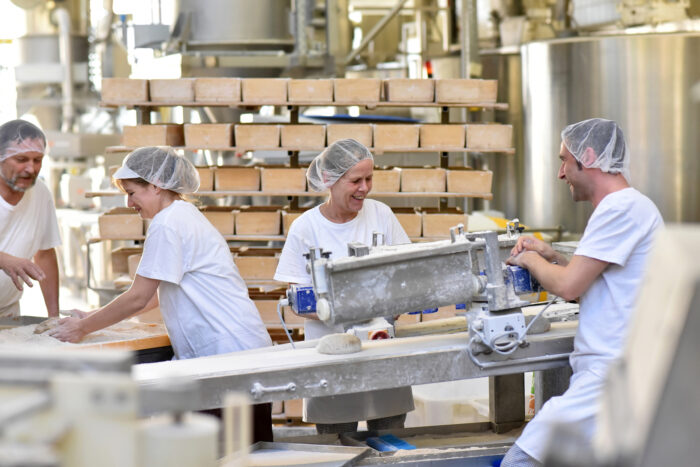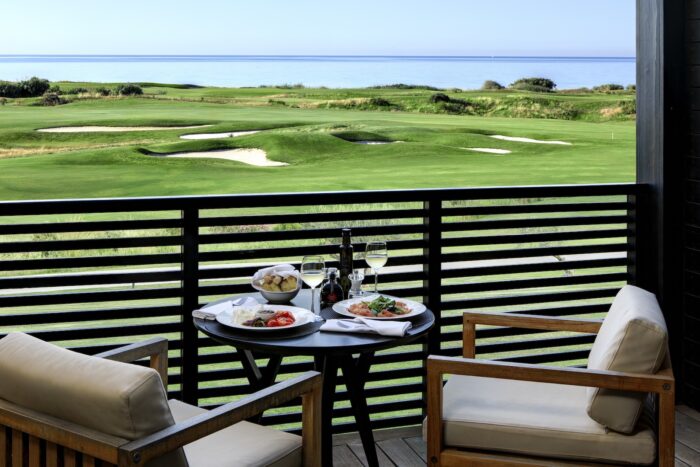Food and beverage: Outsource or in-house?
Many golf clubs outsource their food and beverage operation to an external contractor but, according to industry expert Steven Brown, these are often poor deals for the club that can be significantly improved.
If you owned a family business, would you consider giving it away to a complete stranger for little in return? You wouldn’t.
So why did so many golf clubs, which owned and operated their own food and beverage operations, give away the ‘family silver’?
When I first came to work in the world of golf clubs, I was unaware of the trading model called ‘franchising’ (external operation). This was a system by which golf clubs re-allocated the ‘ownership’ of either their bar or catering units (or both) to an external agent in return for – well, nothing!
As a businessperson I couldn’t get to grips with the concept, introduced over 60 years ago, of passing over these services to individuals who were allowed to take advantage of the club’s generosity and, in the early days certainly, received nothing in return for their generosity.
In many cases, the first so-called franchisees were the clubs’ stewards and stewardesses, who had previously been managing the operations on behalf of the club, but who were then approached by some well-meaning club officials to assume the status of self-employed operatives, with little or no understanding of what that meant for them or the club.
The question is – why did that happen then, and more importantly, why are some clubs still doing this today?
It never ceases to amaze me why golf clubs fly in the face of all accepted economic and accepted business ethics and continue to allow these external agents to ‘abuse’ this privilege.
Is ‘abuse’ too strong a word? Let’s consider the evidence.

Where else in the UK’s trading sector would you find a trading opportunity that provided you with the following as part of the deal:
• Rent free agreement
• Low rental level
• Free utility usage
• Free laundry service
• Free accommodation
• Free use of the club’s own bar or catering staff
• Free use of the club’s admin staff and office supplies
• Free use of tills and card machines
• Freedom to play golf whenever the mood takes them
• Free waste disposal from the waste they generate
• Free kitchen equipment servicing
• Free marketing support to promote their business
• Free cleaning service (restaurant).
Now, if you are reading this and about to pick up the phone to berate me because you don’t do any of these things, then let me tell you that I can only applaud your approach to this thorny issue, but you will be one of the very few clubs in the UK that have achieved that admired status.
I have just completed the writing of a report for a golf club that is about to decide whether it should, or should not, franchise out part of its food and beverage operation. I have laid out the options available, and not at any stage did I suggest that the club adopts any of the archaic trading practices currently still being used in the industry by some of its colleagues.
Why do golf clubs even consider such a move to franchising, never mind these disadvantageous terms?
My experience tells me it is mainly, but not solely, for the following reasons.
1. Their bar or catering operations (or both) are losing money.
2. The club has no practical experience of operating and managing either type of service and are at their wits end trying to plug all the gaps (usually and primarily with the catering service).
3. If any key members of the food and beverage staff leave, they can’t find a suitable replacement to manage the unit that has all of the skills needed. (I totally accept that, in current times, this is becoming a major issue – for further details on the staffing crisis, please refer to my article in the April issue).
4. The club doesn’t want to take the risk, or simply wishes to abdicate responsibility for the food and beverage service to focus on other golf club issues.
There may be other extenuating circumstances, but these are, in the main, the reasons given to me when visiting clubs in my capacity as an external consultant employed to advise them on which option is best to adopt.
Whatever the considerations are, if your club has arrived at the decision to consider the services of an external agent to supply the club with a service to supply food or beverage (or both), then these are the criteria you need to consider:
1. A rental fee.
In pure commercial terms, if the proposed external agent were to set up a business in the high street, providing the same service they give to you, they would be expected to pay a flat rate fee of some 12 to 20 percent of the projected VAT exclusive turnover, and some of that would very possibly be required in advance.

Golf clubs, or those that are charging a fee, are typically receiving an amount down in the low single figures for rental fees.
At least that’s going some way to recover part or all of the cost of the utilities being used at their clubs and for the other services I mentioned that clubs typically provide free of charge.
2. Selecting the right external supplier.
The most obvious criteria is that they have catering / bar experience at the same level that your own services require. Make sure that their ‘aspirations’ match the needs of the club. Ensure that they understand the food and beverage culture that exists within the golfing industry. That culture is unique! Trust me.
I have worked in many different outlets in the food and beverage industry in the UK, and the food and beverage industry in golf clubs offers a unique experience unlike any other food and beverage business I have ever encountered. Why?
They are about to find out they have 750 ‘bosses’, all of whom have different and personal requirements that must be met from their food and beverage service!
Establish that they have sufficient business acumen to understand the complexities of self-employment in all of its forms. (The least of which is an ability to cost out a food dish to give them the gross margin they require to make a profit and pay a commercial rent!)
Obtain copies of all statutory notices relating to a food and beverage service. (Such as basic food hygiene certificates for all food handlers and perhaps their own personal licence if the club has a premises licence.)
Demand a three-year business plan, identifying how they intend to conduct their business at your club to meet your aims and to maximise the opportunities available to them. (In the reports that I generate for my clients, I expand on each of these points with specific recommendations of how to achieve these aims).
3. The agreement.
At INN-FORMATION, we have generated the UK’s only golfing industry specific franchise agreement, using many of the examples I’ve seen at golf clubs across the UK, to identify all of the ‘must do’ criteria, to ensure that the agreement you use is watertight and workable – this is a must.
Too many clubs are disadvantaged, or put at risk in their food and beverage operations, by failing to adopt a strong working agreement.
Make sure your agreement is fair and flexible but commercially sound.
One piece of advice I would most certainly give to the golf club is never to abdicate responsibility for overseeing these operations, once franchised, albeit from a distance.
Far too many times I have had to write in my clients’ reports that, “you have a bad case of the tail wagging the dog” in matters concerning the franchisee and the club, meaning that the club has lost control of their franchisee!

Too many times clubs have become seemingly so reliant on the franchisee to deliver a service at any cost, that they then avoid any confrontation with them to address unacceptable behaviour. You must not allow this. If you do, you open the door to a myriad of ‘abuses’ by franchisees who then begin to dictate menu choices, opening hours and staffing levels to name but a few.
I mentioned previously about being fair and flexible – that works both ways, so don’t let these people take advantage of the club by threatening to walk out if their ‘demands’ are not met. They need to better appreciate the unique business opportunity that exists for them.
Another key point on the fair and flexible approach is this – I have, on a number of occasions, identified excellent external providers who, perhaps through circumstances beyond their control, have run into financial difficulties (Covid is the perfect example).
In such cases I have recommended to clubs that a suspension of rental fees be implemented.
Now, I know that flies in the face of everything I have just written before about commerciality, but it’s not always just about the money.
If the external provider can prove that the financial difficulties they are suffering are beyond their control, but that you recognise that the service they provide is more than acceptable, the quality of food is excellent and that they are generally well respected and liked by the vast majority of the members and visitors, then cut them a bit of slack in the short term to retain their service – think of the bigger picture, namely what’s best for the club and your sometimes demanding clients!
Given all of these issues should your golf club seriously consider the franchising route as an option?
Most certainly, but only when you have a workable business model in place that protects the club’s interest and those of its members.
Every effort should be made to pass on any costs incurred by the club that relate directly to the service provided by the franchisee.

Your members won’t be happy if their annual fees have to rise because of the club’s failure to correctly allocate those food and beverage costs, leading to the club effectively subsidising the units.
People often ask me what my preferred choice is of operating a food and beverage outlet in a golf club.
I am not a fan of giving away the family silver, that’s true, but I fully accept that there are times during a golf club’s life that there will be a need to use the service of an external agent.
That’s fine – just do it properly. Don’t just give away the family silver for the sake of expediency or convenience, and always work diligently to find the right business partner with the right terms.
Steven Brown FBIIt.p. is the head of Inn-Formation and can be contacted on 07785 276320 or emailed via herinn@aol.com















Per quel che vedo portando da anni con Chef in Green molti professionisti a creare dei piatti per una cena a più mani di levatura molto diversa da quella quasi basic che purtroppo si trova nei nostri circoli di golf. Un vero peccato di avere bei percorsi di golf e spesso basso livello di cucina.
Se i circoli di golf hanno bisogno di un aiuto, di una consulenza su questo tema chiamateci vi consiglieremo ottimi chef con i loro tram per dare un adeguato livello slla ristorazione al golf.
Fantastic article that really resonates with me. 2 years ago I decided to bring our bar and catering service in-house and it was the best decision for the club and would highly recommend.
We see both sides here, have numerous examples at 59club of where this work’s superbly well, but likewise not. The common theme on successful outsourcing is the quality of the partner, the detail and performance management criteria in the contract and the win/win element of the relationship.
Is it about a contract that makes money, or one that creates “club life” – I know what I think
Great read.
For what it’s worth I see much of the same all the time, and yes the core of the issue is the leadership (board / committee) have little or no practical understanding of opporational challange and changing customer needs.
Understanding their own custom trends is key…but before that truly atttribute membership fees across the business. IE when a member pays their fees what portion goes to admin, F&B…course upkeep etc??? If clubs did this properly they would be challenging slightly wider than just hanging out F&B (or Pro Shop) for not returning a profit.
A club operation is a team effort so boards need to approach these issues in a slightly more progressive and evidence based method.
With love
♥️⛳️
A common theme and idea that clients in Asia ask me for an opinion on. The answer is most usually no! A club is a place where Members (should) get ‘club service’ from club personnel, directed by qualified club management. Giving the F&B away to a 3rd party does not deliver club service, on so many counts. Manage the business, all parts of it. A golf club is not just golf. And F&B is profitable in its own right, if managed correctly.
Great article, How can you really control the standards of the club if their is an external company managing the F&B ? In my club management experience this has always been a must , control everything you own, including the family jewels